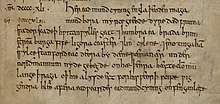
Causantín mac Áeda was an early King of Scotland, known then by the Gaelic name Alba. The Kingdom of Alba, a name which first appears in Constantine's lifetime, was situated in what is now Northern Scotland.
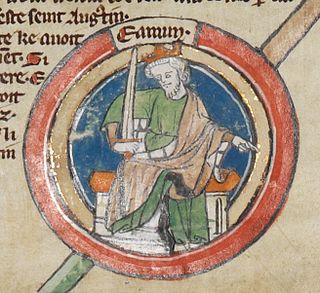
Edmund I or Eadmund I was King of the English from 27 October 939 until his death in 946. He was the elder son of King Edward the Elder and his third wife, Queen Eadgifu, and a grandson of King Alfred the Great. After Edward died in 924, he was succeeded by his eldest son, Edmund's half-brother Æthelstan. Edmund was crowned after Æthelstan died childless in 939. He had two sons, Eadwig and Edgar, by his first wife Ælfgifu, and none by his second wife Æthelflæd. His sons were young children when he was killed in a brawl with an outlaw at Pucklechurch in Gloucestershire, and he was succeeded by his younger brother Eadred, who died in 955 and was followed by Edmund's sons in succession.
Old English literature refers to poetry and prose written in Old English in early medieval England, from the 7th century to the decades after the Norman Conquest of 1066, a period often termed Anglo-Saxon England. The 7th-century work Cædmon's Hymn is often considered as the oldest surviving poem in English, as it appears in an 8th-century copy of Bede's text, the Ecclesiastical History of the English People. Poetry written in the mid 12th century represents some of the latest post-Norman examples of Old English. Adherence to the grammatical rules of Old English is largely inconsistent in 12th-century work, and by the 13th century the grammar and syntax of Old English had almost completely deteriorated, giving way to the much larger Middle English corpus of literature.

Ecgberht, also spelled Egbert, Ecgbert, Ecgbriht, Ecgbeorht, and Ecbert, was King of Wessex from 802 until his death in 839. His father was King Ealhmund of Kent. In the 780s, Ecgberht was forced into exile to Charlemagne's court in the Frankish Empire by the kings Offa of Mercia and Beorhtric of Wessex, but on Beorhtric's death in 802, Ecgberht returned and took the throne.

Eadred was King of the English from 26 May 946 until his death in 955. He was the younger son of Edward the Elder and his third wife Eadgifu, and a grandson of Alfred the Great. His elder brother, Edmund, was killed trying to protect his seneschal from an attack by a violent thief. Edmund's two sons, Eadwig and Edgar, were then young children, so Eadred became king. He suffered from ill health in the last years of his life and he died at the age of a little over thirty, having never married. He was succeeded successively by his nephews, Eadwig and Edgar.

Æthelstan or Athelstan was King of the Anglo-Saxons from 924 to 927 and King of the English from 927 to his death in 939. He was the son of King Edward the Elder and his first wife, Ecgwynn. Modern historians regard him as the first King of England and one of the "greatest Anglo-Saxon kings". He never married and had no children; he was succeeded by his half-brother, Edmund I.

The Danelaw was the part of England between the early tenth century and the Norman Conquest under Anglo-Saxon rule in which Danish laws applied. The Danelaw originated in the conquest and occupation of large parts of eastern and northern England by Danish Vikings in the late ninth century. The term applies to the areas in which English kings allowed the Danes to keep their own laws following the tenth-century English conquest in return for the Danish settlers' loyalty to the English crown. "Danelaw" is first recorded in the early 11th century as Dena lage.

Eric Haraldsson, nicknamed Bloodaxe and Brother-Slayer, was a Norwegian king. He ruled as King of Norway from 932 to 934, and twice as King of Northumbria: from 947 to 948, and again from 952 to 954.

The Battle of Brunanburh was fought in 937 between Æthelstan, King of England, and an alliance of Olaf Guthfrithson, King of Dublin; Constantine II, King of Scotland; and Owain, King of Strathclyde. The battle is sometimes cited as the point of origin for English national identity: historians such as Michael Livingston argue that "the men who fought and died on that field forged a political map of the future that remains, arguably making the Battle of Brunanburh one of the most significant battles in the long history not just of England, but of the whole of the British Isles."

Odathe Good was a 10th-century Archbishop of Canterbury in England. The son of a Danish invader, Oda became Bishop of Ramsbury before 928. A number of stories were told about his actions both prior to becoming and while a bishop, but few of these incidents are recorded in contemporary accounts. After being named to Canterbury in 941, Oda was instrumental in crafting royal legislation as well as involved in providing rules for his clergy. Oda was also involved in the efforts to reform religious life in England. He died in 958 and legendary tales afterwards were ascribed to him. Later he came to be regarded as a saint, and a hagiography was written in the late 11th or early 12th century.
Olaf Guthfrithson or Anlaf Guthfrithson was a Hiberno-Scandinavian (Irish-Viking) leader who ruled Dublin and Viking Northumbria in the 10th century. He was the son of Gofraid ua Ímair and great-grandson of Ímar, making him one of the Uí Ímair. Olaf succeeded his father as King of Dublin in 934 and succeeded in establishing dominance over the Vikings of Limerick when he captured their king, Amlaíb Cenncairech, in 937. That same year he allied with Constantine II of Scotland in an attempt to reclaim the Kingdom of Northumbria which his father had ruled briefly in 927. The forces of Olaf and Constantine were defeated by the English led by Æthelstan at the Battle of Brunanburh in 937.

Amlaíb mac Sitric, commonly called Amlaíb Cuarán, was a 10th-century Norse-Gael who was King of Northumbria and Dublin. His byname, cuarán, is usually translated as "sandal". His name appears in a variety of anglicized forms, including Olaf Cuaran, Anlaf Sihtricson and Olaf Sihtricson, particularly in relation to his short-lived rule in York. He was the last of the Uí Ímair to play a major part in the politics of the British Isles.
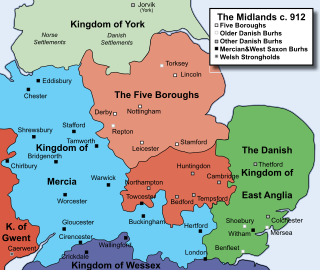
The Five Boroughs or The Five Boroughs of the Danelaw were the five main towns of Danish Mercia under the Danelaw. These were Derby, Leicester, Lincoln, Nottingham and Stamford. The first four later became county towns.

Edward the Elder was King of the Anglo-Saxons from 899 until his death in 924. He was the elder son of Alfred the Great and his wife Ealhswith. When Edward succeeded to the throne, he had to defeat a challenge from his cousin Æthelwold, who had a strong claim to the throne as the son of Alfred's elder brother and predecessor, Æthelred I.
Events from the 10th century in the Kingdom of England.
Ælfgifu of Shaftesbury was the first wife of King Edmund I. She was Queen of the English from her marriage in around 939 until her death in 944. Ælfgifu and Edmund were the parents of two future English kings, Eadwig and Edgar. Like her mother Wynflaed, Ælfgifu had a close and special if unknown connection with the royal nunnery of Shaftesbury (Dorset), founded by King Alfred, where she was buried and soon revered as a saint. According to a pre-Conquest tradition from Winchester, her feast day is 18 May.
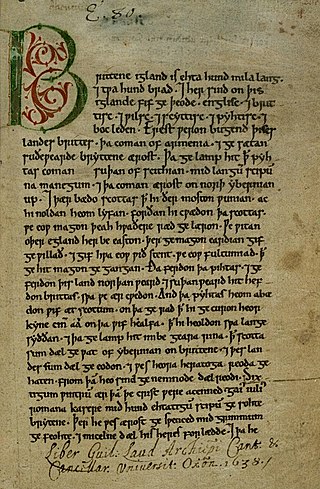
The Anglo-Saxon Chronicle is a collection of annals in Old English, chronicling the history of the Anglo-Saxons.
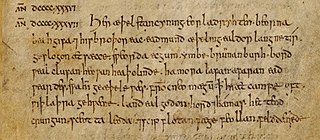
The "Battle of Brunanburh" is an Old English poem. It is preserved in the Anglo-Saxon Chronicle, a historical record of events in Anglo-Saxon England which was kept from the late ninth to the mid-twelfth century. The poem records the Battle of Brunanburh, a battle fought in 937 between an English army and a combined army of Scots, Vikings, and Britons. The battle resulted in an English victory, celebrated by the poem in style and language like that of traditional Old English battle poetry. The poem is notable because of those traditional elements and has been praised for its authentic tone, but it is also remarkable for its fiercely nationalistic tone, which documents the development of a unified England ruled by the House of Wessex.

In the autumn of 1016, the Danish prince Cnut the Great (Canute), supported by Eiríkr Hákonarson, and Thorkell the Tall successfully invaded England. Cnut's father, Sweyn Forkbeard, had previously conquered and briefly ruled England for less than five weeks.
The English king Æthelstan invaded Scotland by land and sea with a large force in AD 934. No record of any battles fought during the invasion has survived and Æthelstan returned to England later in the year.
